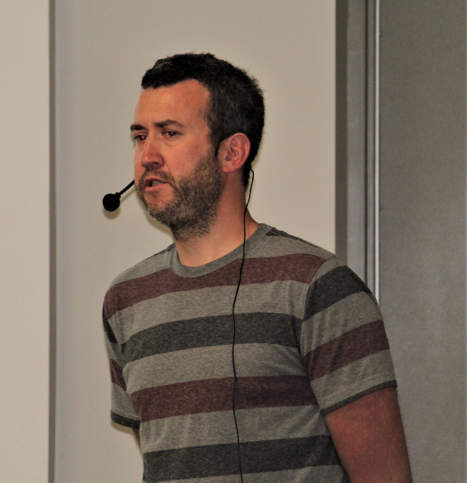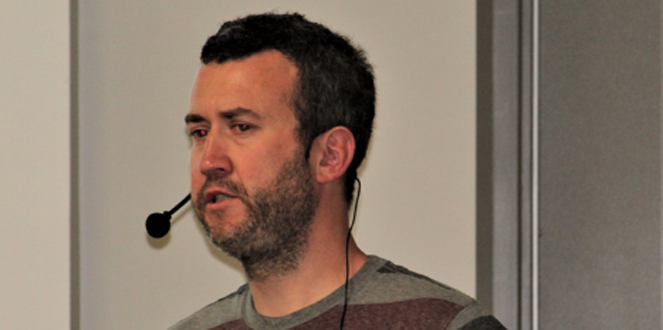Zero Garbage Growth the Focus of LWV Event

By Michael McAllister
A lot of trash talking could be heard not long ago at the Drake Community Library, but it had nothing to do with psyching out an opponent before a game.
Or perhaps it did—if one considers garbage an opponent.
The event, hosted by Grinnell’s League of Women voters, grew out of an earlier LWV-sponsored forum in which representatives of Grinnell’s public works, city council, Imagine Grinnell, and SCISWA (South Central Iowa Solid Waste Agency) provided information about a range of waste management issues, all pertaining to the City’s restructuring of its solid waste management programs.
At the earlier event, Grinnellian Ryan Ferguson, pictured above, made a handout entitled “Tips for Household Waste Reduction” available. The information was based on his and his family’s experience as they have worked to eliminate as much waste as possible from their household.
Ferguson advised LWV President Terese Grant that he would be happy to expand on his experience at a public event, and the League followed with a presentation on Tuesday, April 30.
Although Ferguson quickly disclaims that he qualifies as an expert, he has obviously devoted considerable time, thought, and effort to the topic of waste reduction. He was the force behind a petition from Grinnell Cares to the Grinnell City Council requesting that the City reconsider its decision to end curbside recycling. (The petition and associated information are still accessible at www.grinnellcares.org.)
Efforts in his own home prove that Ferguson not only talks the talk but also walks the walk, as they say; however, he walks the walk to his curb with garbage far less frequently than most. He estimates that his family produces 70 to 80 percent less solid waste than most comparable households.
Three to six weeks can go by before he needs to put trash at the curb, and his family’s efforts to further reduce waste continue.
The following information from Ferguson’s printed material and presentation is a compendium of tips, tricks, and tactics for reducing your landfill footprint.
A New Acronym
As a guiding principle behind efforts to reduce waste, Ferguson offers the acronym WHEM. The word is a reminder to be cognizant of (W) waste, (H) health, (E) energy consumption, and (M) money when making purchases. Something that will yield little waste, will be healthy, requires little energy to be manufactured, and is economical to purchase is, WHEM speaking, the most desirable item.
As an example of WHEM at work, one of Ferguson’s favorite Grinnell stores is Second Mile, a thrift shop and consignment store at 515 Third Avenue. He values Second Mile because when he purchases used items he is extending their life. They have already been manufactured, so he is not increasing environmental impact with his purchase. They are generally not packaged, so no excess material requires disposal. Prices are reasonable, of course, and his purchases keep the items themselves from heading to a landfill.
Garbage is Forever
We marvel at the degree to which the process of mummification preserved ancient Egyptians in their tombs. Future generations are likely to be less entranced by our ability to preserve, say, dog poop in landfills. But that is exactly what we are doing.
Ferguson explained that he once believed that everything he sent to the trash would eventually decompose. It does not, however, since landfills have been required to construct leach-proof ground cells that, when full, are sealed.
He recalled a recent conversation with Jennifer Frampton, Program Director at the South Central Area Solid Waste Agency. Frampton reported that the agency had recently opened a landfill cell that had been sealed for 20 to 25 years. She was still able to read some of the newspapers uncovered.
Less is Less
“Isn’t recycling better” than sending something to the garbage bin? Ferguson asked rhetorically.
“Well…kind of,” he answered, explaining that recyclable materials must be transported, reprocessed, transported again, among other requirements, and each step in the process consumes energy. “A lot of recycling—that’s not helping,” states Ferguson, especially not now that the market for recyclable materials has shrunk.
In the recommendation “Reduce, Reuse, Recycle,” the emphasis should go to the first word.
Imperfect is OK
The goal should be to reduce, not to achieve perfection. Ferguson askes that people do what they can with the idea that even a small degree of reduction is better than the status quo. The issues involved in reducing what we use and what we discard are complex, involving lifestyles, consumer choices, habits, traditions, attitudes, values, and more. Reducing waste is an ongoing process. We aren’t going to score 100 the first time out.

Creative cloth reuse: Carrie Ferguson makes stuffed animals out of old clothing and cloth. Cloth diapers are also part of the Fergusons’ waste reduction strategies.
Compost Posthaste
Composting is a way of reducing food waste in landfills. In fact, food waste makes up almost 20% of the material sent to SCISWA, according to Program Director Jennifer Frampton and a 2017 survey. In fact, almost no food waste should wind up in a landfill.
Some people compost scrupulously to generate rich soil and fertilizer for gardens, and the process may be intimidating to the newcomer. Other people, like Ferguson, are less perfectionist, their goal being to give leftovers a chance to decompose. A compost bin and a leaf pile need not be in perfect balance to divert food scraps otherwise headed for a landfill.
Then, too, there is the garbage disposal.
Waste Reduction and Waist Reduction
Living an eco-friendly life involves lifestyle choices, and usually these choices pay off in multiple benefits. Take something as simple as walking, for example. Taking to foot as opposed to taking the car not only eliminates environmental impact but also gives you exercise—benefits all around.
Substituting tap water for a soda now and then can eliminate not only the soda container from your recycling stream but also excess sugar and empty calories from your body.
Be Annoying
During the question and comment segment of the presentation, one lady brought up vegetable packaging in grocery stores. Vegetables can come with excessive packaging—the head of broccoli that sits on a Styrofoam tray, both wrapped in plastic, for example.
If enough people were to approach the store manager with a request that excessive packaging be eliminated, perhaps it would be.
Other options to reduce packaging include buying in bulk and belonging to a CSA organization (Community Supported Agriculture). Grinnell Heritage Farm and Middle Way Farm are two CSA options for Grinnellians.
Freecycling
If you have something you don’t want, give it to someone who needs it. That is the concept behind freecycling.
Ferguson referred to freecycling as “something that has gone by the wayside,” but he added, “We’re going to try to revive a freecycle-type site—it might just be a Facebook page—for Grinnell. Keep an eye on Grinnell’s social media for developments.
In the Meantime,…
Ferguson advises these four basic steps to significantly reduce household waste.
- Compost food and yard waste for a 25% reduction of landfill-bound materials.
- Avoid single-use products such as paper towels, paper napkins, tissues, and so on. Likewise, cut down on paper that comes via mail. Read magazines online. Ask to be removed from mailing lists that result in catalogs and promotional materials. (A Google search will produce several methods of removing your name from lists.) Steps such as these can reduce waste by 15% if not more.
- Take your own bags to the grocery store, purchase products with limited or no packaging, and make your feelings about excess packaging known to store managers. A 10% reduction in waste can come from these actions.
- If you have babies, use cloth diapers. This step will reduce waste by 10%.
Keep America Beautiful, in 1971, introduced the slogan, “People start pollution; people can stop it.” Stopping pollution is only a partial solution, however, if what would be pollution winds up in landfills.
Today’s emphasis needs to include a general reduction in household waste. People produce it; people can reduce it.





